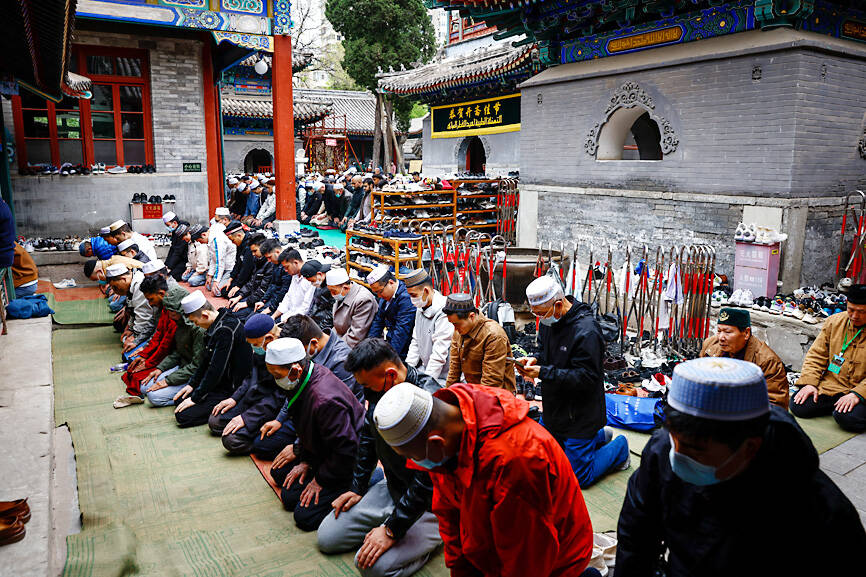The Chinese government has expanded its campaign of closing mosques to regions other than Xinjiang, where for years it has been blamed for persecuting Muslim minorities, Human Rights Watch said in a report released yesterday.
Authorities have closed mosques in the northern Ningxia region as well as Gansu Province, which are home to large populations of Hui Muslims, as part of a process known officially as “consolidation,” said the report, which draws on public documents, satellite images and witness testimonies.
Local authorities also have been removing architectural features of mosques to make them look more “Chinese,” part of a campaign by the Chinese Communist Party (CCP) to tighten control over religion and reduce the risk of possible challenges to its rule, it said.

Photo: EPA-EFE
Chinese President Xi Jinping (習近平) in 2016 called for the “Sinicization” of religions, initiating a crackdown that has largely concentrated on the western region of Xinjiang, home to more than 11 million Uighurs and other Muslim minorities.
A UN report last year found that China might have committed “crimes against humanity” in Xinjiang, including through its construction of a network of extrajudicial internment camps believed to have held at least 1 million Uighurs, Huis, Kazakhs and Kyrgyzs.
Chinese authorities have decommissioned, closed down, demolished or converted mosques for secular use in regions outside Xinjiang as part of a campaign aimed at cracking down on religious expression, Human Rights Watch said.
The Chinese Ministry of Foreign Affairs did not immediately answer faxed questions seeking comment on the report and its official policies toward Muslim minorities.
One of the first known references to “mosque consolidation” appears in an internal CCP document from April 2018 that was leaked to US media as part of a trove of documents known as the “Xinjiang Papers.”
The file instructed state agencies throughout the country to “strengthen the standardized management of the construction, renovation and expansion of Islamic religious venues” and stressed that “there should not be newly built Islamic venues” to “compress the overall number” of mosques.
“The Chinese government is not ‘consolidating’ mosques as it claims, but closing many down in violation of religious freedom,” said Maya Wang (王松蓮), acting China director at Human Rights Watch. “The Chinese government’s closure, destruction and repurposing of mosques is part of a systematic effort to curb the practice of Islam in China.”

EUROPEAN TARGETS: The planned Munich center would support TSMC’s European customers to design high-performance, energy-efficient chips, an executive said Taiwan Semiconductor Manufacturing Co (TSMC, 台積電), the world’s largest contract chipmaker, yesterday said that it plans to launch a new research-and-development (R&D) center in Munich, Germany, next quarter to assist customers with chip design. TSMC Europe president Paul de Bot made the announcement during a technology symposium in Amsterdam on Tuesday, the chipmaker said. The new Munich center would be the firm’s first chip designing center in Europe, it said. The chipmaker has set up a major R&D center at its base of operations in Hsinchu and plans to create a new one in the US to provide services for major US customers,

The Ministry of Transportation and Communications yesterday said that it would redesign the written portion of the driver’s license exam to make it more rigorous. “We hope that the exam can assess drivers’ understanding of traffic rules, particularly those who take the driver’s license test for the first time. In the past, drivers only needed to cram a book of test questions to pass the written exam,” Minister of Transportation and Communications Chen Shih-kai (陳世凱) told a news conference at the Taoyuan Motor Vehicle Office. “In the future, they would not be able to pass the test unless they study traffic regulations

GAINING STEAM: The scheme initially failed to gather much attention, with only 188 cards issued in its first year, but gained popularity amid the COVID-19 pandemic Applications for the Employment Gold Card have increased in the past few years, with the card having been issued to a total of 13,191 people from 101 countries since its introduction in 2018, the National Development Council (NDC) said yesterday. Those who have received the card have included celebrities, such as former NBA star Dwight Howard and Australian-South Korean cheerleader Dahye Lee, the NDC said. The four-in-one Employment Gold Card combines a work permit, resident visa, Alien Resident Certificate (ARC) and re-entry permit. It was first introduced in February 2018 through the Act Governing Recruitment and Employment of Foreign Professionals (外國專業人才延攬及雇用法),

‘A SURVIVAL QUESTION’: US officials have been urging the opposition KMT and TPP not to block defense spending, especially the special defense budget, an official said The US plans to ramp up weapons sales to Taiwan to a level exceeding US President Donald Trump’s first term as part of an effort to deter China as it intensifies military pressure on the nation, two US officials said on condition of anonymity. If US arms sales do accelerate, it could ease worries about the extent of Trump’s commitment to Taiwan. It would also add new friction to the tense US-China relationship. The officials said they expect US approvals for weapons sales to Taiwan over the next four years to surpass those in Trump’s first term, with one of them saying